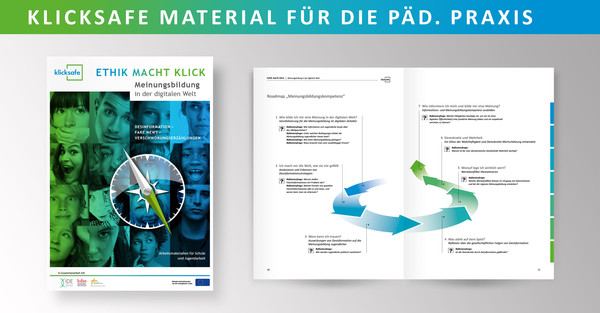Updated klicksafe teaching materialOpinion Formation in Times of Deep Fakes

Young people find themselves in a dilemma: Although they consider social media platforms to be untrustworthy and are aware of possible false reports, they use TikTok, YouTube & Co. as the most important source of information on current topics. Young people are well aware of this contradictoriness, but often do not know how to deal with it. This makes it all the more important to strengthen young people's opinion-forming and information skills.
Material for pedagogical professionals in an updated edition
The updated klicksafe material "Ethics makes click. Opinion Formation in the Digital World" provides insights into the information behavior of young people, offers assistance in analyzing and recognizing disinformation strategies, and shows the effects of misinformation on democratic society. The focus is on a media-ethical roadmap that supports the development of competencies for opinion formation:
- Methodological competence: How do I inform myself?
- Factual competence: What knowledge do I have about media and digital publics?
- Social competence: How do I behave in discussions?
- Ethical competence: How can I develop an attitude?
In addition to comprehensive factual information on the topic of disinformation, 12 teaching units offer educational professionals suggestions for helping students evaluatesources, distinguishfacts from opinions, recognize conspiracy narratives , and checkfacts.
The revised version of the material addresses, among other things, disinformation strategies in Russia's war of aggression against Ukraine and the role of AI-generated images in spreading hate messages.
The handbook "Ethics Makes Click. Shaping Opinion in the Digital World. Disinformation - Fake News - Conspiracy Narratives" was produced by klicksafe in cooperation with the Institute for Digital Ethics (IDE) of the Media University and the Episcopal Media Foundation of the Diocese of Rottenburg-Stuttgart.



